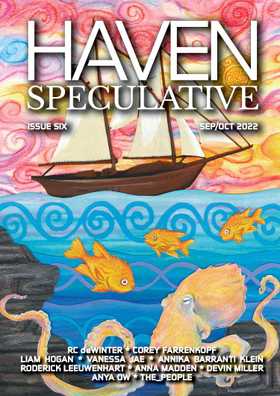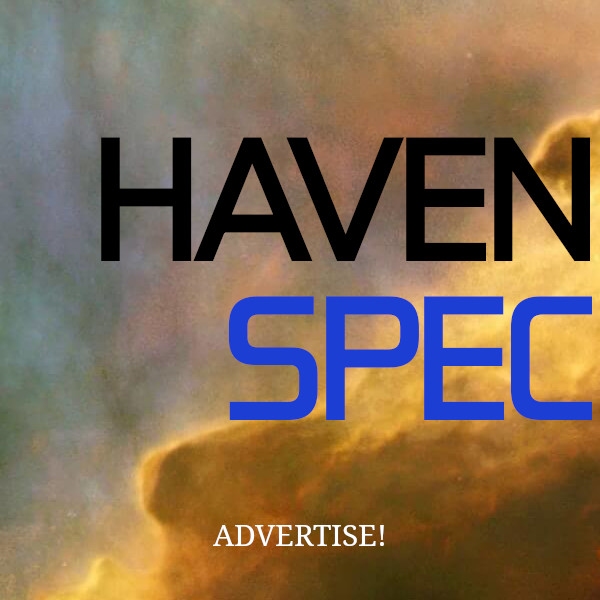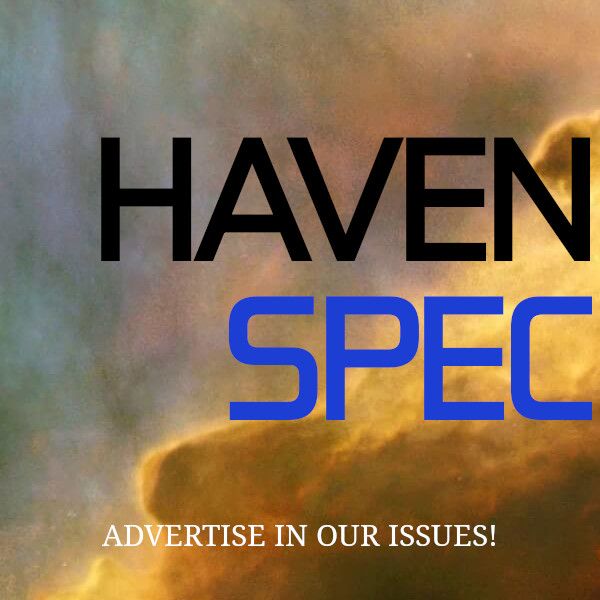FICTION
Daughter of the Great Whales
by Anna Madden in Issue Six, September 2022
The night before the dead boat arrived, I couldn’t sleep. Seal was sharing my nest, built inside a great whale’s lower vertebra, decorated with treasures of fine carapace and a collection of shark’s eyes, turrets, angel wings, even tulip shells. I took the smallest and wove them into my blue-black hair.
As I braided, Seal nestled close, her fingers running lightly across my tracer bracelet. “Will you leave with them on their boat that doesn’t breathe?”
“No,” I said. “This is my place.” Did my voice falter, just then?
Seal’s expression wavered, lit in the surrounding fluorescent glow emitting off the great whale’s metallic bones. I knew that she didn’t believe me.
I meant to be grateful to her, truly I did. Without Seal, I wouldn’t have survived. Still, the islands weren’t a place for beginnings. I was beached here, and though I wasn’t alone, sometimes I thought I might as well have been. I longed for what I had lost—for the voices of many, the sense of belonging, and the love that my first family offered to me so freely, never a prize to be earned.
I clung to my past. To the hope my father was still out there, hunting me, and to my mother, long dead like the great whales before her.
#
The wind was mulled with gulfweed and red algae and menace when the matriarch took our pod’s youngest to hide while the strongest battle-sisters readied for the fight ahead. Like Seal, I belonged among the latter.
I zipped my silver-scaled jumpsuit to my neck, then claimed my harpoon gun, its stainless steel warm and familiar. Armed, I turned to face the blush of day, its waking light showing me all I had to lose. The islands looked untouched. There weren’t buildings or walls or barbed wire. The once great whales lurked beneath the sand, their metal skeletons hidden by the native palms, the cliff sides, and the plastic garbage of men that washed ashore each tide.
Men and their sons weren’t welcome on these shores. Rarely, I’d witnessed their trades with my battle-sisters, but I’d heard they’d easily steal from us instead. It was in their natures to be greedy, or so the matriarch said.
Their dead boat approached from the east, carried by a strong tailwind. I heard the shackled great whale heart inside it stir, trying to beat though drowned, long imprisoned and forsaken. Its sad melody reminded me of my own troubles, of the ache which swelled within. As the pod’s singer, I often heard what others couldn’t.
Aiming my harpoon gun, I fired, the sharp-edged steel embedding itself into a banyan tree’s bark. I grabbed the line, tucking my feet up to avoid the metal ribs of a half-buried great whale below and swinging to a rocky ledge. The scent of fear, like a layer of salt rime, filled the air.
Blue and Seal waited there. They’d been born to these islands, giving them higher standing than me. Still, they couldn’t hear the songs of the great whale hearts nor the longing washed in by the sea, soaking into the sands.
“You’re late, little calf,” Blue said, her voice the usual sneer. She wore a flashy jumpsuit given to the pod on the last trade. The fabric was modified, cut to display a mottling pattern along her back’s skin, the effect like sun-streaked water. Her thick hair was piled high, held by a metal clip. She, like Seal, didn’t wear a tracer bracelet made of twined baleen and curved titanium, for neither needed to earn their place in the pod.
A horn blew.
I looked to the sea. The unwelcome boat of metal raised itself out of the breakers, the surf frothing like bits of fallen clouds. The hull was sleek, designed with great whale technology—a fine tailstock and fins, able to dive and surface at will.
Seeing it woke something deep within. This was the cycle of my own tides: the excitement each time men arrived, followed by a crashing wave of disappointment when my father wasn’t among them.
My father had been a captain. Not of a true great whale, of course. Not one of those beings that breathed in and out, whose fins shadowed the sky as well as the sea. Still, his dead boat had been the first to chain a great whale’s heart to its engine, and his command over his men had been as certain as a matriarch’s song over her pod.
Seal pulled back a loose strand of my hair, smoothing it. I looked over, taking in her black and white marbled skin. She wore no ornaments, her limbs streamlined—long in the torso and broad at the shoulder. I hoped my uncertainty wasn’t obvious. Too late, her lips dipped into a crescent-shaped frown.
No doubt Blue took my hesitation for disrespect, but it only hurt Seal to know I held something back. I couldn’t say which was my true family—the pod or my parents. Men were the pod’s greatest enemy. A truth I couldn’t fully accept.
Together, we three watched the seafarers take a skiff to the beach, unarmed, glancing about each other like chitons, easily spooked back into their shells.
“Fools,” Blue said. “Do they think to come and go as they please?”
“They look like traders,” I said, my words wet and rushed. “Nothing more.”
Blue scoffed, her disbelief and mistrust apparent. She was only a little older than me, yet she was born to these islands. A fact she often pointed out with superiority. It was obvious, for her skin had a bluish tint, while mine was still yellowish, sand-like. She was destined to earn the devotion of a great whale heart, to become a matriarch, as I could never do or be.
Still, I stared back, nettled and bad-tempered, hot blood burning my cheeks. “I’ve known men’s hearts,” I said curtly, my defiance surprising me. I wasn’t one to challenge the hierarchy of rank, but this was different. Blue’s words had hit where it hurt the most.
Blue unsheathed a fillet knife at her waist and pointed it at me.
I’d gone too far.
I clicked my teeth in submission and dropped my eyes, catching the hoary-gray glint of the tracer bracelet on my wrist.
Seal positioned herself between Blue and me. “We’re to fight our enemies,” she hissed. “Not each other.”
Blue’s eyes turned glacial. “I’ll never understand what you see in this daughter of men.”
“Moray is one of us,” Seal said, her eyes worried.
Moray. The name didn’t sound true even after so many years.
“You’re looking into the sun,” Blue said to Seal. “It’s blinded you.” Blue pointed at me with the knife, then frowned, as though considering an idea but yet uncertain of it. “Moray will swim out first to sniff out their intentions, for she has memories of their ways.”
I swallowed. This was a test. I’d worn my tracer bracelet far longer than any pod member before me, and the result was a growing wariness that I couldn’t be relied on. Maybe worse. “What if they try to claim me?”
Blue laughed in that dead way of hers.
“None can capture you easily,” Seal said, her words soothing. “We will listen for your tracer, and if you activate it, we will hear its song calling us.”
I kept my shoulders back. I wanted to prove myself to Seal. More, I desired to speak with the men—and maybe, just maybe, ask after my father’s name. It was my right to find him if I wanted to. I nodded. In truth, I longed for this.
“Come, little calf, we’ll take you part of the way.” Blue smirked, putting away her fillet knife. With the natural grace of water, she rose and headed to the shoreline.
It was like men to be bold, to steal and to break what wasn’t of value to them, but if they had wanted to challenge us, they wouldn’t have arrived in so few numbers. Nor sailed into harbor in daylight.
As battle-sisters, we were meant to defend, and we wouldn’t let our matriarch or the younger calves down. Still, in my heart, I knew the tides were out of their natural rhythm.
Seal and I followed Blue, passing by a lone palm tree. It creaked in the wind, its trunk peeling, stunted, crowned with fanned leaves. Black-tipped gannets pecked at plastic debris. We kept hidden from the men’s sight, where alkalic rocks braced against harsh waves, the sound like bones fracturing.
“Are you alright?” Seal asked, drawing alongside me, her eyes softening as she reached for my elbow as if to steady me.
I hadn’t the words to answer. My father had become the ghost net I couldn’t avoid, still catching fish years after it had been lost. I sped up, nearing Blue’s heels. My grip tightened on the harpoon gun I carried. From behind, I heard Seal’s footsteps, strong and true.
Seal had taught me to shoot the harpoon guns, how to untie the hardest knots, and where to find each of the great whales resting places before I could sense their metal or hear their undying songs. It wasn’t her fault that Blue scolded me. Perhaps I only had myself to blame.
But I couldn’t follow the current without looking back. Sometimes, I questioned what happened to cause the great whales’ slaughter. My pod never spoke of it. More, I would have liked to see a great whale—truly seen one, flying among the many shades of blue within the sea and the sky.
The pod guarded these islands, and for this, we received the last gifts of the great whales. We were women, but like anything left in the sun long enough, we had changed, becoming something else too.
Ahead, Blue led us in an arrow formation, circling the skiff and approaching open waters. There, Seal touched my arm. “The water will lend you its gifts,” she said, then stepped back. “Use them.”
I dipped my feet into the sea. My silver-scaled jumpsuit kept me warm even as my skin drank the salty water, ever thirsty, and fed the strength of the reefs through my blood. I dove, hiding beneath the quick water, letting the current carry me out so I might circle back and flank the traders or would-be conquerors.
As I surfaced, my long hair dripping, I heard shouts of alarm, deep-voiced and ugly, coming from the men. My approach was theatrical, meant to intimidate. To scare a predator, it was best to act like one. I tumbled from the waves, landing swift and sure on my feet with bent knees. I was stronger with the water at my back and my skin slick and wet. If need be, I could escape the way I’d arrived.
Still, I hesitated, my heart pounding against its cage of flesh and bone. Despite my claims to Blue, I’d seen few men up close. When dead boats appeared in my first days among the islands, I was supposed to hide with the other calves, but my memories of a different life were fresher then, my grief at its sharpest, cutting me. I’d wanted my father still, so I hadn’t listened.
A sailor once stole the ring off my finger which bore my family crest. If not for Seal, who knows what might have happened after. Seal leapt from the sands, driving him off, then half-led, half-dragged me back to shelter. She’d cried over me. Said my attacker desired my unclouded skin, my mane of blue-black hair.
Seeing her distress then, I’d clicked my teeth, trying to calm her. But in truth, it was she who’d calmed me, providing an anchor I needed.
Now facing men again, I was older—wiser. I could defend what belonged to me. I promised myself things would be different. I’d prove myself to Seal but still find the answers I sought. I gripped my harpoon gun with resolve.
The crew of seafarers circled me. Their voices were loud, brash. They seemed sluggish, their movements predictable and slow.
A man leered at me. “Hey pretty fish…you one of those sirens? Let’s hear you sing then.”
His voice carried a familiar accent, stirring old memories. I ignored his question and his tone. I had good practice at that, having lived alongside Blue. I hunted for a sign of their allegiance or, hope against hope, my father’s face among them.
“Careful,” another said. He had a chin of twig-like hair and bad teeth. “She’s got a wild look.”
One fool stepped closer. In a flash, I moved, my harpoon gun aimed and readied. The breaking waves crashed behind me, loud and commanding. I glared, and the group jumped back, no better than a squawking wreck of sea birds.
The captain approached. Despite my moon-eyed wish, I saw he was too young to be the one I hunted. “Back to the ship, all of you.” Inkwork shaded his neck, and his lips were stern, his eyes a commanding algae-green.
As the seafarers shuffled away, the captain alone remained. He stood tall, framed in a sun-bleached jumpsuit the same sleek cut as mine. It was close-fitted, zipped from waist to collarbone. A weapon I recognized—a pistol—hung from his right hip. It made me uneasy.
The wet sand was firm against my bare feet. The risen sun glared, hot and unblinking. I found comfort in my harpoon gun, and I kept my stance, not backing down or showing weakness.
“Sorry about that,” he said, his face unreadable as he spoke to me. “My men are afraid of what they don’t understand.”
His voice wasn’t unpleasant. It had a depth I liked despite myself. Still, I remembered the sailor who had stolen my ring in my youth, and I hissed softly. A part of me hoped all men would turn into rotten fish and disappear in the waves of the highest tide.
All save for my father. Thinking so, my hopes resurfaced, but I kept my body language clear: touch me and I’d bite.
“I am sent,” I said, speaking slow to ensure he understood. “The great whales are not pleased. Your dead boat is not sanctioned, nor was a trade arranged and agreed to prior.”
“I know,” he said. He planted his boots in the sand despite his words, rooting himself. “What are you called?”
I gestured to his dead boat of metal sheets welded together, the insides overflowing with bolts, wires, and more. “Tell me first, what is the name of that dead boat’s heart?”
“That’s Blacktip, and I am her captain, Isak Sanders.”
I bit my bottom lip. The dead boats in my father’s command were named after sharks, so this captain’s vessel belonged to their numbers. “Are you familiar with other dead boats in the Second Fleet?”
Isak leaned forward. “How do you know of the Second Fleet?”
Realizing my mistake too late, I tightened my grip on the harpoon gun. It was unwise to reveal such truths, for men were cunning, always ready to take advantage. No doubt they meant to claim us all one day. I thought he’d smirk, but instead, the captain’s face twisted strangely.
“Let’s make a trade. I will tell you what you ask of,” Isak said insistently, “but in exchange, give me your name.”
I ignored his offer even as I watched his hands. I knew too well the damage a pistol could inflict. “What news have you of Sandtiger?”
Isak Sanders tilted his head, a glint in his green eyes I didn’t like. “Lost at sea two years ago. There are rumors a pod sunk her, for she traveled into untamed waters often. Her captain was obsessed with a lost treasure. You knew someone aboard, didn’t you?”
“I have nothing more to ask,” I said, tight-lipped. I wouldn’t let Isak see my grief, though my heart drowned in sorrow. I reached for the storm within me, an anger as old as I was, and wore it like an outer skin. Within, a power stirred, for the great whales had gifted me much. The tidal waves spilling across the beach swelled, frothing, crashing louder. A power strong enough to call a rogue wave that could fling this so-called captain back into the sea. My skin glowed as I gestured with my harpoon gun toward the open water. “It’s time you left these shores.”
Isak kept his face blank, but I saw his right hand moving to his waist. I clapped my jaw several times, the noise loud, meant to threaten.
Again, I’d gone too far.
Seal had told me tales of men with false tongues and bad intentions. I could fight. My battle-sisters would come if I called. But so long as I remained on land, the power swelling in my blood was limited and draining. Even the force of the sea couldn’t dislodge a rocky sea stack. And I couldn’t evade well-aimed bullets.
With the safety of the water at my back, I was turning to flee when a nylon net snapped in the air, its cerulean diamond mesh tightening over me. I’d been a fool, letting my own wants distract me, weakening my senses and my guard.
I struggled, my normal strength greater than a cast of men, but already my skin was far too dry, and the woven plastic held. Taking advantage, the forgotten crew circled me with ease, pinning off my escape and freedom of the sea.
With a solid knock to my skull, the world slipped away.
#
I woke with a fierce headache and breathed in salt and mildew and lost years. A lantern offered light, but not so well dispersed as the natural glow within a great whale. I was inside a small cabin beneath the dead boat’s deck. I took in the polished metallic glint of it, the exotic woodwork furniture, and the scent of parchment. My hands and feet were tied with rope.
The ground churned, rocking to a strange cadence. The sad lament of the dead whale’s heart was so close it vibrated my skull. Its ghost reached out to me—its sense of self sinking in a world no longer recognizable.
Though the great whale’s cry swept through me, angering me for its trade into men’s hands—or perhaps its theft—I couldn’t comfort it, for whatever men touched, in short time became theirs alone.
Breathing slowly helped steady me. No sign of my harpoon gun, but I felt the edge of my tracer bracelet cutting into my forearm. I sighed with relief. The rope wouldn’t take long to manage. I had Seal’s lessons to thank for that.
As I worked the knots, my anger burned, setting my sand-like skin awash in faint blues and greens. How dare these men try to claim me? My pod was right. Men couldn’t be trusted. Isak Sanders lacked honor. He could have shot me—but maybe he planned worse.
I knew of guns and the greed of men. There’d been gunshots the day I’d watched my mother bleed out. I’d smelled the iron and salt of her even as she urged me to climb the metal railing of the ocean liner transporting us. Too well, I remembered jumping to the waves below. Better I drowned than what awaited me above the surface.
Somehow, I’d survived that ugly raid. The sea carried me to the islands, to the resting place of the great whales.
I was a survivor.
My hands slipped free of the ropes, and I reached for the tracer bracelet, never more grateful for my pod’s mistrust. It couldn’t be removed unless the great whales granted a full blessing of acceptance. It was a rite of passage—a sign of my womanhood grown into full bloom and a sanction to create life and renew it. To continue the cycle of our ways, our traditions.
Along the smooth metal’s surface, a small lever could be turned, and I twisted it to release its hidden song. I was tugging on the ropes across my feet when the cabin door creaked open.
“I brought water,” Isak said.
I worked faster lest he try to stop me.
“I’ll—” he started again but didn’t finish.
The ropes loosened. I was free, past my anger, full of old vengeance and more—the frustration of a life adrift. The pain of the great whale’s heart imprisoned inside the dead boat rose in my ears, its distress akin to mine. I leaped upward, a hiss in my throat, and slammed into the captain’s shoulder. Isak grunted, and I went for his pistol, yanking it from the holster and pointing the muzzle at his chest.
I gestured Isak Sanders into the cabin, the pistol awkward in my grip, the cold barrel a familiar nightmare I’d never wanted to revisit.
“It’s not what you think,” he said, his feet obedient to my command. His deep voice sounded weary.
I narrowed my eyes. “Explain.”
“Your name is Eliza Ferner. I didn’t sail into this harbor to collect great whale hearts or healing oil or the images stored in ancient teeth. My cousin was the captain of Sandtiger. I should have realized—you have the old man’s cheeks, his nose, but those eyes of yours, and that hair—the great whales are still capable of much.”
Isak watched me as he slowly reached into a pocket and pulled out a ring—the one I had lost, its round sapphire the color of the night sky and the band entwined silver, forming two lithe dolphins. I snatched it from his outstretched hand. It was then I realized the pattern tattooed on his neck roughly matched the design.
The metal band was colder than I expected. Inside me, I knew what had been misplaced could be reclaimed. I could take back the life I’d been born to.
“Eliza,” he said, “please. Put down the pistol.”
The name was precious to me. But I thought of Seal and I faltered, the gun shaking in my grip. Isak had tried to claim me, loading me on his ship without asking my permission, as though I were cargo to be bought and sold. Despite our shared blood, his conceit marked him as my enemy.
“That isn’t my name,” I said.
“It is,” Isak said. He held my eyes. “You know it is.”
I considered him. Isak offered me the treasure I sought, but it was like finding a shiny object in the sand, picking it up, and realizing it was sun-warped plastic. My past was part of me, but I could not go back and expect it to be as it was. My parents were distant stars. More, I’d been changed by the great whales, my appearance and reflexes a testament to their touch, their shaping.
If I lived among men, I’d belong to them. I would dry out, my skin cracking, my bones and flesh turned to sand, buried like the great whales themselves, but lost forevermore.
“Tell whoever you serve, admiral or distant relation or both, it’s a mistake,” I said. “Say Eliza Ferner isn’t among the great whales.”
As I spoke, my tracer bracelet clicked open. With a small tug, it would drop free. My heart unfolded, no longer absorbed solely by my own sorrows. I was part of the pod despite all I’d carried to the islands.
“Why would I do that?” Isak asked. He shook his head, the inkwork on his neck contorting eel-like with the motion. “Why would you want me to?”
I took my finger off the pistol’s trigger. “For great whale hearts and healing oil and the images stored in ancient teeth. My pod will be here soon, for I have called them. Do you want to live? You could be rich.”
“Surely this life can’t be worth all that.”
“No,” I said. “It’s worth more. The great whales…they aren’t finished with this world yet.”
Through the open door, I heard a sailor yell. Splashes followed. My battle-sisters had arrived to aid me. “You must decide, Isak Sanders. Give me your word you won’t speak my name again nor seek me out, and the great whales will hold you to it.”
In offering this, I was protecting Isak. I was still my father’s daughter, though my heart could never be kept captive so long as Seal still breathed. But I had found my family.
It was my right to choose, and it was my right to claim both.
Isak had brought me news of the past, but more, he had revealed an honesty I hadn’t expected. He’d brought me aboard without asking, but Isak’s face was familiar, enduring—the expression a soft tracing of my father’s. I listened and heard a song that matched my own. A rhythm I couldn’t deny.
“You don’t need to pay me,” he said. “I’ll do as you ask.”
I lowered the gun and reached for my dangling tracer bracelet, clicking it around his own wrist.
Isak stared down at it and nodded, his face flushed. His expression was misty, like when seawater rose to kiss a dusky moonset. He had bound himself to me and the great whales, and through the tracer bracelet, I knew his promise would hold true.
I handed back the pistol but kept the ring, diving back to the door and my battle-sisters. My heart beat steady, doubled, linked to another’s—to the soul of a great whale. I traced wood grains in the door. “My name is Moray.”
And then I was gone, too fast for him to follow.
My voice rose up, the command of a matriarch-to-be in its depths. My song sounded different, like the soft rainfall after a night-long storm, and it spilled out of me. I told my battle-sisters not to kill, not to harm. Blue answered back with an edge of exasperation, annoyed at my new rank—but she didn’t challenge it. Instead, she gloated at her own skill, her ability to save me. As for Seal, her answer made my double heartbeat quicken. She was proud, unsurprised by the change in me, her attachment unwavering.
At her song, my eyes blurred, the last of my anger fading. I had a home, a pod, a place within this world. Soon, I would trace the call of the great whale who’d chosen me. I would become a matriarch.
Soon, I would match my voice to the heartbeat of this bruised world until men and their sons heard it too, singing back.
© 2022 Anna Madden
Anna Madden
Anna Madden is a writer and Acquisitions Editor for Dark Matter Magazine and Dark Matter INK. Her fiction has appeared in Apex Magazine, Orion’s Belt, PseudoPod, and elsewhere. In free time, she makes birch forests out of stained glass. Follow her on Twitter/X @anna_madden_ or visit her website at annamadden.com.





